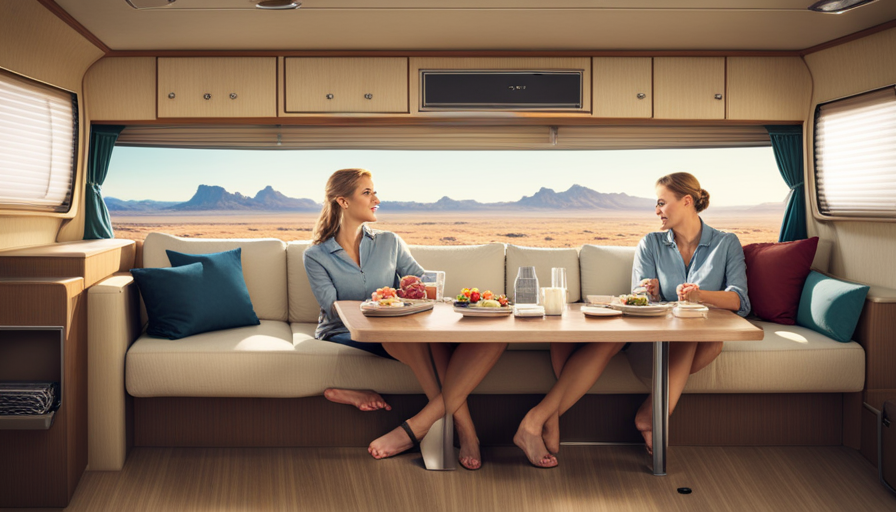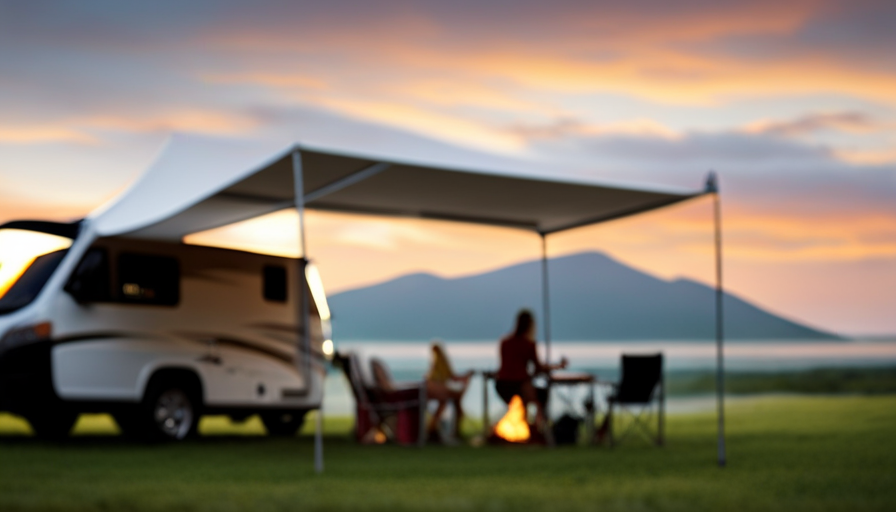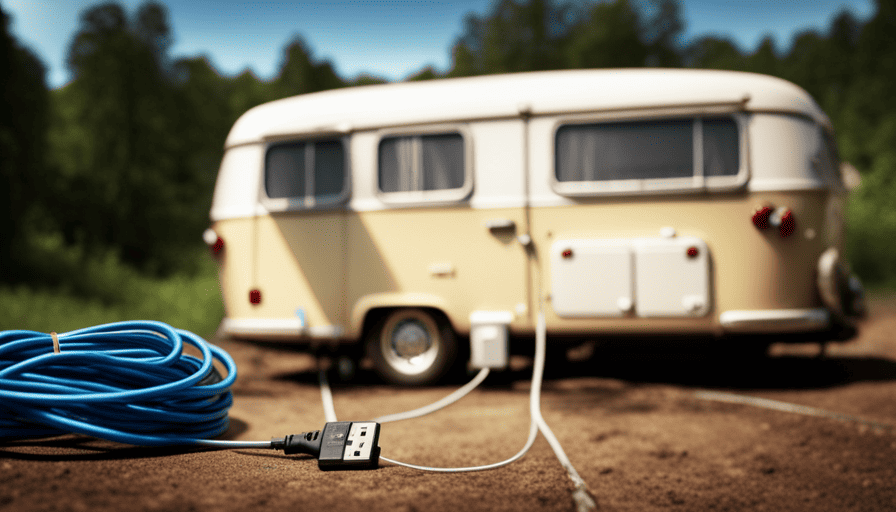You have decided to explore the thrilling world of buying a used camper. Whether you are a seasoned camper or a newbie, choosing the perfect RV requires careful observation and understanding of key factors to consider.
In this article, we will delve into the fascinating world of used campers, exploring the myriad of factors to consider before making your purchase. From determining your needs and budget to inspecting the exterior and interior, we will guide you through the process step by step, ensuring that you make an informed decision.
Additionally, we will provide you with valuable tips on researching the brand and model, evaluating the electrical and plumbing systems, considering storage and amenities, as well as negotiating the price and terms.
So, let’s dive in and uncover the secrets to finding your dream used camper!
Key Takeaways
- Determine needs and budget
- Research brand and model
- Inspect exterior and interior
- Test appliances and systems
Determine Your Needs and Budget
Before you start shopping for a used camper, it’s important to determine your needs and budget. This will help you narrow down your options and ensure that you find a camper that meets your specific requirements.
To determine your needs, think about how you plan to use the camper. Are you planning on going on weekend trips or extended vacations? Do you need a camper with a specific number of beds or a certain amount of storage space? Consider factors such as size, amenities, and layout.
Once you have a clear idea of your needs, you can set a budget. Determine how much you’re willing to spend on a used camper, taking into account not only the initial purchase price but also any potential repairs or maintenance costs. Research the market to get an idea of the average price range for the type of camper you’re interested in.
By determining your needs and setting a budget, you can ensure that you find the perfect used camper that fits your lifestyle and financial situation.
Now, let’s move on to the next step and research the brand and model.
Research the Brand and Model
When researching a brand and model, what features should I be considering? Here are three key factors to keep in mind:
-
Research benefits: Look into the specific features and amenities offered by the brand and model you’re interested in. Does it have a spacious interior layout? Is there ample storage space? Does it come with a reliable heating and cooling system? Understanding the benefits of the camper will help you determine if it aligns with your needs and preferences.
-
Brand reputation: It’s crucial to research the reputation of the brand and model you’re considering. Read reviews from other owners and industry experts to get an idea of the camper’s reliability and durability. A reputable brand will often have a track record of producing high-quality campers that stand the test of time.
-
Resale value: While you may be purchasing a used camper, it’s still important to consider its resale value. Some brands and models hold their value better than others, making them a smarter investment in the long run. Researching resale values will give you an idea of how well the camper retains its worth over time.
By researching the brand and model, you can ensure that you make an informed decision when purchasing a used camper. Once you’ve gathered all the necessary information, it’s time to move on to the next step – inspecting the exterior.
Inspect the Exterior
Take a moment to admire the exterior of the camper and let its charm and potential adventures capture your imagination. The exterior inspection is an important step when buying a used camper as it can reveal potential repairs and give you an overall idea of the condition of the vehicle.
Start by checking the body for any signs of damage such as dents, scratches, or rust. Pay attention to the seams and corners as these areas are prone to leaks. Look for any signs of water damage, such as soft spots or discoloration on the walls or roof.
Inspect the windows, doors, and awnings to ensure they open and close smoothly. Check the tires for any signs of wear or cracking, and make sure they have enough tread. Look underneath the camper for any signs of rust or damage to the frame.
Additionally, inspect the exterior lights and electrical connections to ensure they’re functioning properly. Once you’ve completed the exterior inspection, it’s time to check the interior and see what the camper has in store for you.
Check the Interior
When checking the interior of a used camper, we need to be on the lookout for signs of water damage or mold. This can indicate potential problems with leaks or poor insulation.
Additionally, it’s important to thoroughly test all appliances and systems to ensure they’re in proper working order. This includes checking the stove, refrigerator, air conditioning, heating, plumbing, and electrical systems.
By carefully inspecting the interior, we can identify any potential issues and make an informed decision about purchasing the camper.
Look for signs of water damage or mold
Inspect the camper closely for any evidence of water damage or mold, as these hidden dangers can turn your dream of a cozy adventure into a nightmare of costly repairs and health hazards. When looking for signs of water damage or mold, pay attention to the following:
- Check for discolored or stained walls, ceilings, or floors, as this may indicate a past or current leak.
- Look for soft spots or warping in the flooring, as this could be a sign of water damage.
- Examine the corners, edges, and seams of cabinets and furniture for any signs of mold growth.
- Inspect the bathroom thoroughly, including behind the toilet, under the sink, and around the shower, as these areas are prone to water damage and mold.
By thoroughly inspecting the camper for water damage and mold, you can ensure the safety and longevity of your investment.
Once you’ve completed this step, it’s time to test all appliances and systems to ensure they’re in proper working order.
Test all appliances and systems
Once you’ve completed the thorough inspection for water damage and mold, it’s time to ensure that all the appliances and systems in the camper are in proper working order, like a symphony of functionality waiting to be enjoyed.
Start by testing each appliance, such as the refrigerator, stove, and microwave. Make sure they power on and operate as expected. Don’t forget to check the air conditioning and heating systems, ensuring they provide the desired temperature control.
Additionally, test the plumbing system by running water through the sink, shower, and toilet. Look out for any leaks or unusual sounds.
It’s also important to inspect the electrical system by trying out all the lights, outlets, and switches. Common issues to watch out for include faulty wiring or blown fuses.
Finally, ask the seller for maintenance records, so you can have a better understanding of the camper’s history and potential future issues.
With these testing procedures and knowledge of common issues, you’ll be well-equipped to make an informed decision on your used camper purchase.
Transitioning into the next section, it’s crucial to ask for maintenance records to gain insight into the camper’s upkeep.
Ask for Maintenance Records
Be sure to request the maintenance records before making a decision, so you can feel confident about the quality and reliability of the used camper you’re considering. By discussing the maintenance history with the seller, you can gain valuable insights into how well the camper has been cared for and any potential issues that may arise in the future.
Additionally, it’s important to ask about any warranty coverage that may still be valid, as this could provide added peace of mind.
When reviewing the maintenance records, pay close attention to the regular servicing of the camper’s engine and other mechanical components. Look for evidence of routine oil changes, filter replacements, and brake inspections. This will give you an idea of whether the camper has been properly maintained and if any major repairs have been performed.
Another important aspect to consider is the maintenance of the camper’s appliances and systems. Look for records of regular maintenance on the refrigerator, air conditioning unit, heating system, and plumbing. These are vital components that can greatly impact your camping experience, so it’s important to ensure they have been well taken care of.
Lastly, don’t forget to inquire about any repairs or upgrades that have been made to the camper. This can give you an idea of the overall condition and potential value of the vehicle.
With the maintenance records in hand, you’ll have a better understanding of the camper’s history and can make a more informed decision.
Now, let’s move on to the next step: test drive and inspect the mechanics.
Test Drive and Inspect the Mechanics
Hop behind the wheel and feel the engine hum like a contented cat as you take the camper for a spin, giving you a firsthand experience of its mechanics and performance.
Before making a purchase, it’s essential to test drive and inspect the mechanics of a used camper. During the test drive, pay close attention to the engine’s responsiveness, acceleration, and braking. Listen for any unusual noises, such as knocking or rattling, as they could indicate underlying issues. Additionally, assess the handling and stability of the camper, ensuring it feels comfortable and safe on the road.
Once the test drive is complete, it’s time to conduct a thorough mechanical inspection. Open the hood and inspect the engine for any signs of leaks, corrosion, or worn-out parts. Check the transmission fluid, brake fluid, and coolant levels, ensuring they’re at the appropriate levels. Examine the tires for any signs of wear or uneven tread, as this could indicate alignment or suspension problems.
As you conclude the mechanical inspection, transition into the subsequent section about evaluating the electrical and plumbing systems. These systems are crucial for a comfortable camping experience, so it’s important to ensure they’re in good working order.
Evaluate the Electrical and Plumbing Systems
Get ready to explore the inner workings of the camper by evaluating the electrical and plumbing systems; you’ll be amazed at the level of comfort they can provide during your camping adventures.
When buying a used camper, it’s essential to thoroughly evaluate the condition of the electrical and plumbing systems. Start by checking the electrical system, ensuring that all lights, outlets, and appliances are in proper working order. Test the battery and generator to make sure they’re functioning well. Look for any signs of frayed wires or loose connections, as these can indicate potential issues.
Next, turn your attention to the plumbing system. Check for any leaks or water damage, as these can be costly to repair. Run the faucets and shower to ensure proper water flow and temperature control. Check the water heater and water pump to ensure they’re in good condition. Evaluate the condition of the toilet and waste disposal system, as these are crucial for a comfortable camping experience.
If you’re not confident in evaluating the electrical and plumbing systems yourself, consider hiring an expert to inspect these components. They’ll have the knowledge and experience to identify any potential problems and provide you with an accurate assessment of the camper’s condition.
As you evaluate the electrical and plumbing systems, keep in mind the importance of considering the storage and amenities the camper offers.
Consider the Storage and Amenities
The camper’s storage compartments and luxurious amenities will transport you to a world of convenience and comfort during your camping adventures. When considering the storage options, it’s important to look for ample space to store all your camping gear and supplies. From large exterior compartments to interior overhead cabinets, having enough storage space will make your camping experience more organized and enjoyable.
Additionally, consider if the camper has a dedicated space for larger items such as bikes or kayaks, as this can be a major convenience.
The amenities available in the camper can greatly enhance your camping experience. Look for features such as a well-equipped kitchen with a refrigerator, stove, and microwave, allowing you to prepare meals just like at home. A comfortable sleeping area with a cozy bed is essential for a good night’s rest. Other amenities to consider include a bathroom with a shower, a TV and entertainment system, air conditioning, and heating. These features will ensure that you have all the comforts of home while on the road.
As you evaluate the storage options and amenities of a used camper, keep in mind that these factors can significantly impact the overall value and enjoyment of your purchase. With the perfect combination of storage and amenities, your camping adventures will be elevated to a whole new level of convenience and comfort.
Now, let’s transition into the next section and explore how to negotiate the price and terms of your camper purchase.
Negotiate the Price and Terms
Finding the perfect balance between price and terms during negotiations can be the key to unlocking a camper purchase that leaves us feeling satisfied and excited. When it comes to negotiating the price of a used camper, it’s important to do your research and be prepared.
Start by researching the market value of similar campers in your area to get an idea of what a fair price would be. This will give you a starting point for negotiations and help you determine if the seller’s asking price is reasonable. Additionally, consider the condition of the camper and any repairs or maintenance it may need, as this can also affect the price.
In addition to negotiating the price, it’s important to consider the financing options available to you. If you’re planning on financing the purchase, compare interest rates and loan terms from different lenders to ensure you’re getting the best deal. Some sellers may also offer financing options, so be sure to inquire about this possibility as well.
As you negotiate the price and terms, keep in mind that it’s important to get everything in writing. This includes the agreed-upon price, any repairs or modifications that will be made, and any warranties or guarantees that are included. This will help protect both parties and ensure that everyone is on the same page.
Get a Written Agreement and Documentation
When buying a used camper, it’s crucial to have a written agreement that clearly outlines the terms of the sale. This agreement should include important details such as the purchase price, any warranties or guarantees, and any conditions for the sale.
Additionally, it’s essential to ensure that you receive all necessary documentation and paperwork, such as the title, registration, and maintenance records. By obtaining these documents, you can verify the ownership, history, and condition of the camper, giving you peace of mind and protecting your investment.
Have a written agreement outlining the terms of the sale
Make sure you’ve got a solid contract in place that outlines all the terms of the sale, so you don’t end up with any surprises down the road. A written agreement provides legal protection and ensures that both parties are clear on their responsibilities.
Here are four key elements that should be included in the contract:
-
Purchase price: Clearly state the agreed-upon price for the used camper, including any additional fees or taxes that may apply.
-
Condition of the camper: Describe the condition of the camper accurately, including any known issues or defects. This will prevent any misunderstandings later on.
-
Warranty information: Specify if there is any warranty or guarantee provided by the seller, and clearly outline the terms and duration of the warranty.
-
Payment terms: Outline the agreed-upon payment method, including any deposit or installment plans.
Having a written agreement in place will protect both the buyer and the seller. Once you have this in order, it’s essential to ensure you receive all necessary documentation and paperwork to complete the sale smoothly.
Ensure you receive all necessary documentation and paperwork
Getting all the essential paperwork and documentation is crucial to avoid any potential legal issues or headaches during the sale process when buying a used camper. It is important to ensure that you receive all the necessary paperwork from the seller, such as the title, registration, and any maintenance records.
These documents will provide proof of ownership and help you verify the history and condition of the camper. Additionally, make sure to obtain any warranties or service contracts that may still be valid. It’s also a good idea to request a bill of sale, which will outline the terms and conditions of the purchase.
By obtaining all the necessary paperwork and documentation, you can have peace of mind knowing that you have all the information you need to make an informed decision and protect yourself legally.
Frequently Asked Questions
Are there any specific safety features or upgrades that should be considered when buying a used camper?
When considering safety features and upgrades for a used camper, it’s crucial to prioritize those that enhance your overall security and comfort.
Look for features such as anti-lock brakes, stability control, and a reliable alarm system.
Upgrades like reinforced chassis, upgraded suspension, and advanced towing systems can significantly improve your camper’s stability and towing capabilities.
Additionally, consider features like smoke detectors, carbon monoxide alarms, and fire extinguishers to ensure a safe living environment while on the road.
What are some common maintenance issues or repairs that may arise with certain camper brands or models?
When it comes to common maintenance issues and repairs with camper brands and models, there are a few things to keep in mind.
Some common issues include water leaks, electrical problems, and issues with the plumbing system.
It’s important to research specific camper brands and models to see if there are any known issues or recurring problems.
Regular maintenance and inspections can help identify and address these issues before they become major repairs.
How important is it to consider the weight and towing capacity of the camper in relation to the vehicle that will be used to tow it?
When considering buying a used camper, it’s crucial to take into account the weight considerations and towing capacity in relation to the vehicle that’ll be used for towing. Exceeding the towing capacity can put excessive strain on the vehicle’s engine, transmission, and braking system, leading to potential safety hazards and costly repairs. Therefore, it’s essential to carefully match the camper’s weight to the vehicle’s towing capacity to ensure a safe and enjoyable towing experience.
Are there any specific warranty options available for used campers, and what should be considered when deciding whether to purchase a warranty?
When considering warranty options for used campers, there are a few factors to keep in mind. According to a recent study, only 30% of used campers come with a warranty. This statistic highlights the importance of carefully evaluating whether to purchase a warranty.
Key considerations include the length of coverage, what exactly is covered, and the cost. Additionally, it’s essential to review the warranty provider’s reputation and customer service track record.
Are there any legal requirements or regulations that need to be considered when purchasing a used camper, such as registration or insurance?
When purchasing a used camper, it’s important to consider legal requirements and insurance considerations.
Legal requirements vary depending on the state or country, but typically involve registration and fees. It’s crucial to ensure that the camper has proper documentation and is registered in your name.
Additionally, insurance is essential to protect your investment and cover any potential damages or accidents. It’s recommended to research different insurance options and choose a policy that suits your needs and budget.
What Are Important Factors to Consider When purchasing a Camper, Whether New or Used?
When buying a camper, questions play a key role. Whether opting for a new or used one, it’s crucial to inquire about the maintenance history, potential repairs, and overall condition. Other factors to consider include the size, layout, amenities, and budget. Conducting a thorough inspection and asking detailed buying a camper questions will ensure a smart and informed purchase.
Conclusion
In conclusion, when on the hunt for a pre-loved camper, it’s vital to thoroughly evaluate your requirements and financial situation.
Extensive research on the brand and model will ensure a wise investment. Don’t forget to carefully inspect both the exterior and interior, while requesting maintenance records for added peace of mind.
Taking a closer look at the electrical and plumbing systems is crucial, as is considering the storage and amenities available.
Lastly, skillful negotiation, a written agreement, and proper documentation will seal the deal. Happy camping!










